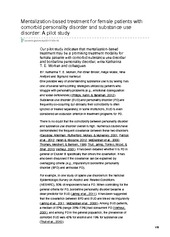| dc.contributor.author | Morken, Katharina Teresa Enehaug | |
| dc.contributor.author | Binder, Per-Einar | |
| dc.contributor.author | Molde, Helge | |
| dc.contributor.author | Arefjord, Nina | |
| dc.contributor.author | Karterud, Sigmund | |
| dc.date.accessioned | 2018-10-19T13:47:26Z | |
| dc.date.available | 2018-10-19T13:47:26Z | |
| dc.date.issued | 2017 | |
| dc.identifier.issn | 1894-5570 | |
| dc.identifier.uri | https://hdl.handle.net/1956/18653 | |
| dc.description.abstract | Objectives: In this study, we investigated the feasibility of mentalization-based treatment (MBT) for patients with comorbid substance use disorder (SUD) and borderline personality disorder (BPD). No published study has ever specifically looked at MBT for these patients. Such individuals are known to have a very poor prognosis and harbor much pain and misery. Moreover, few randomized controlled trials exist on psychotherapy efficiency for patients with comorbid substance use disorder and borderline personality disorder. There is an urgent need for more knowledge on treatment for this patient group. Design: A pilot project within a naturalistic clinical setting with longitudinal data collection during treatment and at follow-up. Eighteen female patients attended a pilot project and participated in up to 36 months of treatment, according to the manuals. Patients were measured on primary (pre/post) and secondary (longitudinal) outcome measures before treatment, every six months during treatment, at the end of treatment, and at follow-up approximately two years after treatment. Methods: Statistical analyses of repeated outcome measures (GSI, CIP, GAF, WSAS, and RSES) and of pre/post measures (Axis I and II diagnosis) were performed with linear mixed models, and Cohens d was calculated. Results: Significant improvements on primary and secondary outcome measures were demonstrated, with effect sizes ranging from moderate to large. With respect to primary outcome, these SUD/PD patients were almost fully recovered from their SUD at follow-up (a predicted score of 0.2 Axis I SUD diagnosis at follow-up in comparison with a score of 1.8 at baseline). Conclusion: MBT as performed in this pilot project indicates promising results for patients with (mostly borderline) PDs and comorbid SUDs. Performing RCT studies is warranted. | en_US |
| dc.language.iso | eng | eng |
| dc.publisher | Psykologisk.no | eng |
| dc.relation.ispartof | <a href="http://hdl.handle.net/1956/18654" target="blank"> Mentalization-based treatment of female patients with severe personality disorder and substance use disorder</a> | |
| dc.subject | borderline personality disorder | eng |
| dc.subject | linear mixed models | eng |
| dc.subject | mentalization | eng |
| dc.subject | pilot study | eng |
| dc.subject | psychotherapy | eng |
| dc.subject | substance use disorder | eng |
| dc.title | Mentalization-based treatment for female patients with comorbid personality disorder and substance use disorder: A pilot study | eng |
| dc.type | Peer reviewed | |
| dc.type | Journal article | |
| dc.description.version | publishedVersion | |
| dc.rights.holder | Copyright the author and psykologisk.no. All rights reserved | eng |
| dc.source.articlenumber | e16 | |
| dc.identifier.doi | https://doi.org/10.15714/scandpsychol.4.e16 | |
| dc.identifier.cristin | 1543902 | |
| dc.source.journal | Scandinavian Psychologist | |
| dc.source.40 | 4 | |
